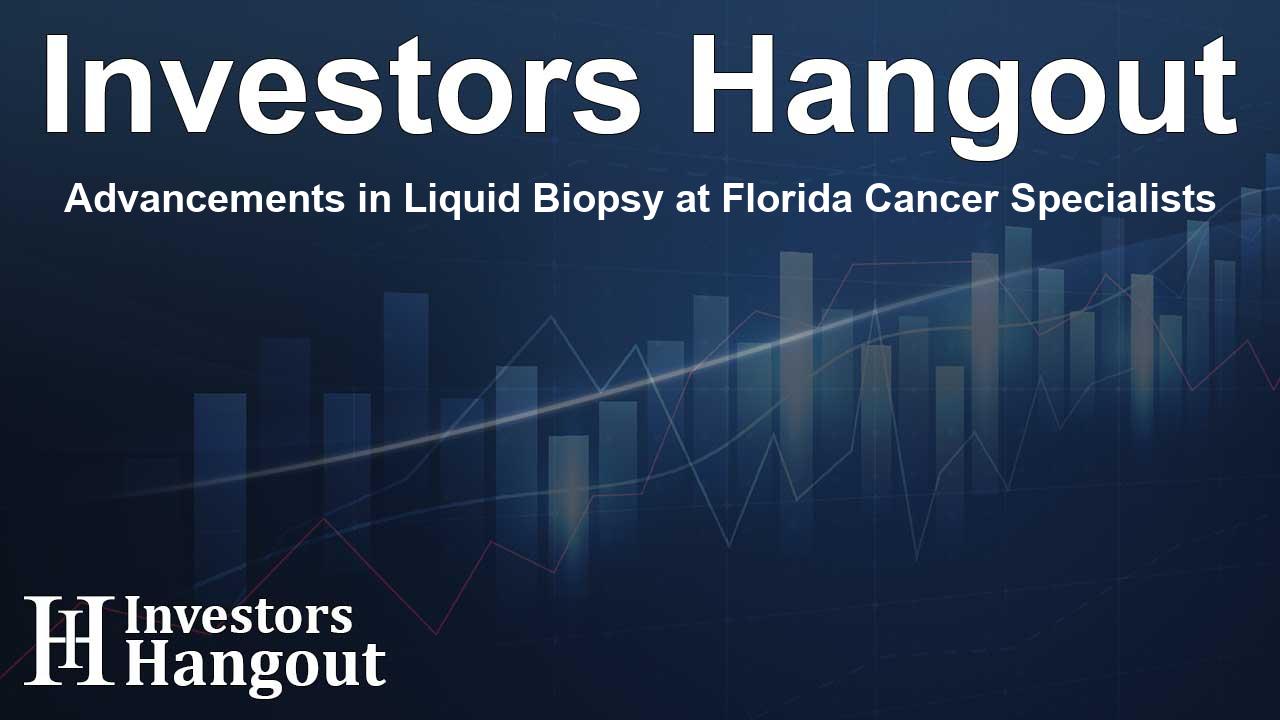Advancements in Liquid Biopsy at Florida Cancer Specialists

Florida Cancer Specialists Enhances Cancer Diagnosis with Liquid Biopsy
Florida Cancer Specialists & Research Institute is proud to announce the introduction of liquid biopsy, a groundbreaking blood test that effectively identifies cancerous tumors and cells in the bloodstream. This advancement signifies the practice's ongoing commitment to enhancing genomic testing, which is fundamental in improving cancer care and patient experiences.
What is Liquid Biopsy?
Liquid biopsies are revolutionary techniques that utilize a simple blood draw to obtain circulating tumor DNA (ctDNA) for analysis. This method is particularly advantageous for diagnosing various common cancers, especially in advanced stages, such as lung, colorectal, breast, and prostate cancers. Jennifer Gass, PhD, the associate director of the FCS Genetics Laboratory, emphasizes that this test allows for rapid genetic insights, which can significantly influence treatment plans and patient management.
History and Development
Until recently, traditional biopsies involved invasive procedures to extract tissue samples for laboratory testing. The shift to liquid biopsy reflects a growing trend towards non-invasive methods that are more comfortable for patients. Gass noted that the ease of repeat testing means that healthcare providers can continuously monitor treatment responses without subjecting patients to discomfort.
Since the launch of next-generation sequencing (NGS) capabilities at their centralized laboratory in 2021, Florida Cancer Specialists has expanded its testing options tremendously. This practice now serves over 102,000 patients through its network of 250 physicians and has received an astounding number of visits annually. The volume of molecular tests processed has surpassed 16,000 at their laboratory facility.
Leading in Genomic Testing
The comprehensive scope of genomic testing available at Florida Cancer Specialists positions it as a leader among community oncology practices. Lucio N. Gordan, MD, the FCS President, articulates that their genomic profiling not only identifies actionable mutations for most cancer patients but also creates personalized treatment strategies, aligning with the goals of precision oncology.
Recent advancements to their NGS testing offerings include HRD (homologous recombination deficiency) assessments and specialized panels for myeloproliferative neoplasms. The introduction of these tests represents a commitment to using cutting-edge technology for better patient outcomes.
Future Innovations
Dr. Gass anticipates that as molecular technology evolves, the precision and efficacy of these tests will only improve. FCS's acquisition of advanced sequencing technology, like the Illumina NovaSeq, enables rapid processing of numerous samples, with turnaround times that meet industry standards. However, what truly differentiates them is the integration of clinical data into analyses, providing healthcare providers with comprehensive insights.
The Team Behind the Innovation
At the heart of this advancement is a dedicated team led by laboratory services vice president, Nicole Radford, who indicates that their deeply knowledgeable team consists of board-certified genetic scientists and specialized molecular scientists. Adhering to strict quality standards ensures that testing remains efficient and reliable, which is crucial in delivering timely results to patients.
A Vision for Patient-Centered Care
Nathan H. Walcker, the CEO of FCS, articulates their dedication to investing in innovative technologies for the best patient outcomes. The effort to adapt and implement the latest advancements showcases their commitment to providing exceptional cancer care.
Florida Cancer Specialists exemplifies over 40 years of innovation in the oncology field, initiating significant transformations in cancer care through its robust clinical research program. The practice ensures that patients often have earlier access to the latest treatments prior to FDA approval, positioning FCS as a pioneering force in cancer research and patient care.
Frequently Asked Questions
What is a liquid biopsy?
A liquid biopsy is a non-invasive blood test that detects circulating tumor DNA in the bloodstream, helping to diagnose and monitor various cancers.
How does liquid biopsy differ from traditional biopsy?
Unlike traditional biopsies that involve invasive tissue sampling, liquid biopsies use a simple blood draw, making them significantly less invasive and easier for patients.
What types of cancers can liquid biopsy help detect?
Liquid biopsy is particularly effective in assessing lung, colorectal, breast, prostate, and certain blood cancers.
What advancements has Florida Cancer Specialists made in genomic testing?
FCS has expanded its testing options to include next-generation sequencing and specialized tests for various cancer types, helping tailor treatments to individual patient needs.
Why is genomic profiling important in cancer treatment?
Genomic profiling provides insights into actionable mutations, allowing physicians to devise personalized treatment plans that enhance patient outcomes.
About The Author
Contact Henry Turner privately here. Or send an email with ATTN: Henry Turner as the subject to contact@investorshangout.com.
About Investors Hangout
Investors Hangout is a leading online stock forum for financial discussion and learning, offering a wide range of free tools and resources. It draws in traders of all levels, who exchange market knowledge, investigate trading tactics, and keep an eye on industry developments in real time. Featuring financial articles, stock message boards, quotes, charts, company profiles, and live news updates. Through cooperative learning and a wealth of informational resources, it helps users from novices creating their first portfolios to experts honing their techniques. Join Investors Hangout today: https://investorshangout.com/
The content of this article is based on factual, publicly available information and does not represent legal, financial, or investment advice. Investors Hangout does not offer financial advice, and the author is not a licensed financial advisor. Consult a qualified advisor before making any financial or investment decisions based on this article. This article should not be considered advice to purchase, sell, or hold any securities or other investments. If any of the material provided here is inaccurate, please contact us for corrections.
